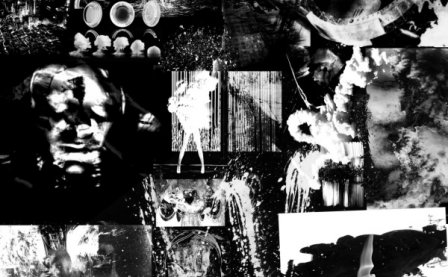In David Lynch’s Lost Highway, there’s a scene where a detective is investigating the strange videos that are showing up at the front door of main character Fred Madison’s residence. When asked if he owns a video camera, Madison replies that he does not, and the reason he gives is that he likes to remember things his own way. Rather than embrace the dominant idea of remembering the past as it “really” happened, Fred prefers to allow fantastical aspects into his conception of memory. For him, remembering is an act that is less structured and always undergoing structuring processes.
Daniel Menche’s Kataract puts forward a picture of memory similar to Fred’s. For this album, which is packaged in the explosively stunning artwork of Emily Hyde, Menche has assembled field recordings of various Pacific Northwest waterfalls into one 40-minute track of absolutely pulverizing natural sonic manipulation. The soft glistening water-sounds that linger as we reach the fall quickly transform into monstrous textures of pounding water and the joyfully horrible, sublime feeling of being covered in unimaginable volume. The sound-power of the water is terrifying, reinforcing the fact of human smallness in relation to the vastness of nature.
By assembling these waterfall sounds, Menche is challenging the way we think about, or remember, nature. One can imagine hundreds of tourists pouring out of buses, schlepping a camera, multiple children and fun-size snacks, gazing at a waterfall with smiling faces and, perhaps, contemplating the serenity and beauty of it all. In contrast, Menche invites us to experience the brutal nastiness that lingers just underneath this rosier picture, isolating and revealing the sound-terror that will be forgotten weeks later as the tourists share their photos with envious co-wage-slaves back at the office. What would the boss think if the tourist played him Kataract instead of showed him photos of hot dog-devouring, grinning children standing in front of the falls? What if we remembered nature not as the idyllic fantasy land of dreamy philosophers and romantics, but as a screeching, grinding, stabbing overload of horror and violence?
Even if we do choose to remember or think of nature in this latter way, we are not prohibited from finding it beautiful. It is only fools who think that beauty and tranquility are necessarily connected. Furthermore, even if we accept a story of nature that constructs it as a horrifyingly violent place where the only thing that is inappropriate is morality, this does not preclude the possibility of loving “it” or caring for “it.” There’s no reason to think that Menche has documented these sounds simply to expose a perpetually underlying dread, but instead perhaps to present a space for natural awe that will result in a stronger form of respect. The consequence of listening is initially terror, but this ought to lead to admiration and care.
If this is the case, then Menche might find a comrade in Werner Herzog. In the 1982 documentary Burden of Dreams, which tells the perilous but triumphant story of the making of Herzog’s Fitzcarraldo, Herzog speaks profoundly about the jungle:
Taking a close look at what’s around us, there is some sort of harmony… it is the harmony of overwhelming and collective murder, and we in comparison to the articulate vileness and baseness and obscenity of all this jungle, we in comparison to that enormous articulation, we only sound and look like badly pronounced and half-finished sentences out of a stupid, suburban novel, a cheap novel, and we have to become humble in front of this overwhelming misery and overwhelming fornication… overwhelming growth and overwhelming lack of order. Even the stars up here in the sky look like a mess. There is no harmony in the universe. We have to get acquainted to this idea that there is no real harmony as we have conceived it. But when I say this, I say this all full of admiration for the jungle. It is not that I hate it. I love it. I love it very much, but I love it against my better judgment.
Similarly, Menche is presenting the obscenity of the falls and of nature, but he is also doing much more.
More about: Daniel Menche




